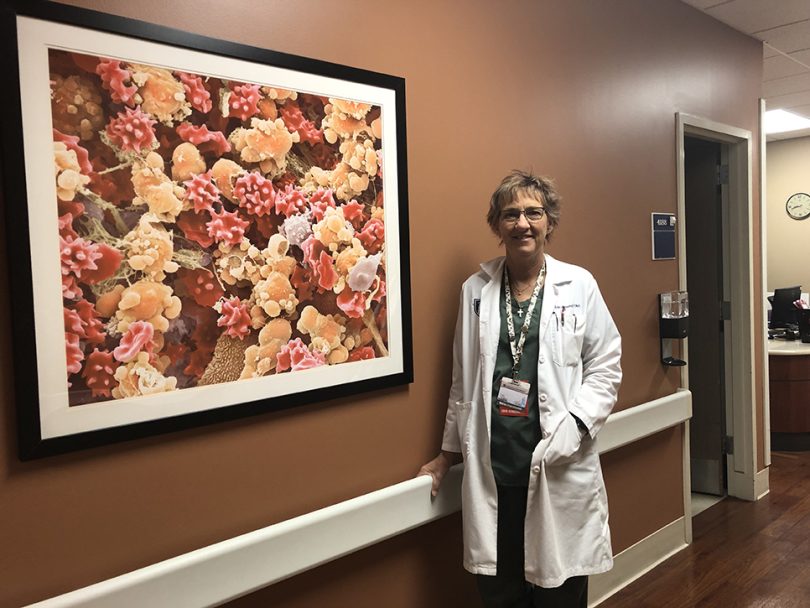For Lynn Allmond, this week will be bittersweet.
After 30 years in Augusta – arriving as a clinical specialist and then working as Nurse Practitioner at AU Health – she is retiring, leaving the place she and her husband have called home for three decades.
She’s seen a lot of changes and loved her career, where she’s found increasingly challenging roles since arriving in Augusta in 1993.
“When I got here, they’d just built (the Medical Office Building) and the ICU area. Then they built (Children’s Hospital of Georgia). Then they built the Georgia Cancer Center, so I watched all of this stuff happen in 30 years,” she said a little wistfully. “That’s a lot of stuff to see. And then to go, sorry, you’re not a part of it anymore.”
When she walks out the door for the last time Friday, Allmond will have left the organization and her profession here a little better than she found it. Advanced Practice Providers now have an organized governing body, thanks in large part to her.
For 15 years, while she worked in women’s health as part of the family medicine and gynecology departments, she found there were no organizations dedicated to APPs. No committees, no informal group of peers, and no standardization.
“It was just, there’s a nurse practitioner, there’s a physician’s assistant, over there’s another nurse practitioner. We didn’t know each other. We didn’t have any support system,” she said.
She tried repeatedly to organize a group of peers who could support each other and perhaps advocate for one another when necessary. For one reason or another, it never seemed to work.
APPs are nurse practitioners and physician assistants who are trained as advanced practice providers and can provide the same level of care – including writing prescriptions – without having a medical degree. They increase the number of patients who can be seen at a facility while continuing to provide a high level of care. In Georgia, they work collaboratively with a physician.
In addition to not having an organized group of peers, Allmond noticed that there was a lot of discrepancy in pay and benefits across the APPs she did encounter, as much of those issues were left up to the individual departments.
A few months ago, a fellow NP took up the reins and was successful in gaining support from nursing faculty and administration. Now, AU Health has an APP Council whose mission is to “maximize APP participation within the organization, promote communication, transparency and inclusivity, and enable recruitment and retention of APPs who practice within Augusta University,” according to its written mission statement.
Allmond said the first thing they did was look at standardizing pay and benefits across all APPs.
“It’s about making everybody work at the top of their license equally across the board. It’s a place for them to go if they have a problem,” she said. “Now we have a subgroup that falls under administration. We are the advanced practice. We’re not residents, we not students, we’re not nurses, or respiratory therapists. We’re like doctors, and we need to work like that.”
Allmond admitted being a little disappointed that she tried so hard to organize a group for so long, only to have one form as she’s retiring. She expressed a little regret that she will not get to be a part of it. But mostly she’s happy for the colleagues she’s leaving behind. They really needed this, she said.
Allmond and her husband have moved to a family farm in Emmanuel County, where she is looking forward to enjoying a slower pace of life. They will have dogs, cats, chickens and goats, and will relax by their own pond and tend to a garden.
Two days a week she will work in a rural health clinic near her new home. She’s not ready to give up practicing completely yet.
She said it’s bittersweet not only to leave AU Health, but also to leave Augusta. For the past 30 years, it’s been home.
“I moved here not knowing a soul, and this place became my family,” she said.


